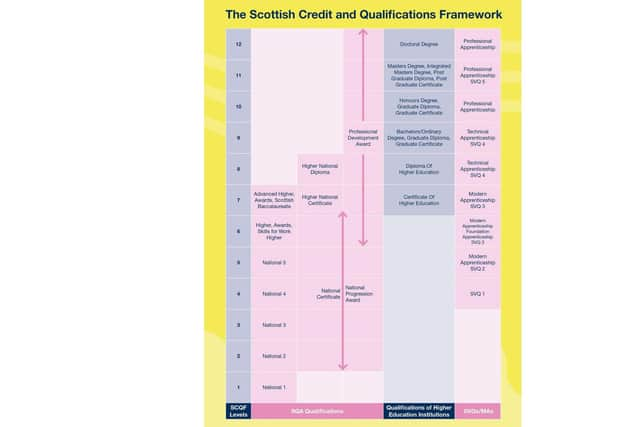Fife College offers a wide range of qualifications and courses


Whether you are a parent or carer of a child choosing subjects at school or someone looking to upskill or retrain, you may be finding the range of qualifications available confusing.
If that sounds like you – don’t worry! Fife College, as a SCQF Ambassador College, is here to help.
In recent years, there have been many changes to the range of qualifications on offer - giving everyone more choice and more opportunities to reach their goal. It can, however, seem complicated – especially if you’ve not been in the world of education for a while.


Let’s start with a list of the main qualifications you may come across in Scotland:
• Access courses – Fife College offers a range of access courses for those leaving school with few qualifications, including Certificates (SCQF level 4), Intermediate Certificates (SCQF level 5) and Advanced Certificates (SCQF level 6); they can also be the perfect choice for those returning to study.
• National 1-5, Highers, Advanced Highers and Scottish Baccalaureates – these are normally studied at school; however, Fife College also offers some National 5 and Higher level courses.
• Foundation Apprenticeships – these are work-based qualifications for secondary school pupils in S4 to S6, which enable young people to kick start their career while still at school. In partnership with Fife Council, Fife College offers 10 different Foundation Apprenticeships at SCQF Level 6, which is the same level as an SQA Higher. Some new Foundation Apprenticeships are also now available at SCQF levels 4 and 5.


• Skills for Work courses – combine study in school or college with learning at work.
• National Certificates (NC) – normally studied at college, and National Qualifications (NQ) are qualifications are normally studied at school or college.
• Scottish Vocational Qualifications (SVQ) – these include work-based learning; for example, if you’re doing a Modern Apprenticeship, you could achieve an SVQ.
• SQA Wider Achievement awards – these recognise the life and work skills that learners have gained.
• Scottish Wider Access Programme (SWAP) – offered at college to support adult learners who haven’t studied for a while and have no formal entry qualifications, to access Higher Education study at college and universities (SCQF level 6).
• Higher National Certificate (HNC) and Higher National Diploma (HND) – these are usually studied at college, and an HNC (SCQF level 7) and HND (SCQF level 8) are equivalent to the first two years of a degree course. A HNC may be offered as part of a School College Partnership programme supporting progression to higher education and degree study quicker after leaving school.
• Degrees, Masters Degrees and PhDs – usually studied at university, but some colleges including Fife College, offer degree and honours degree courses in partnership with universities.
• Professional and Technical Apprenticeships and Modern Apprenticeships (MAs) – completed through work and apprentices may attend college part-time.
• Graduate Apprenticeships – these provide an alternative route to achieve a degree qualification while in employment.
Further information on all of these qualifications can be found on the Qualifications Explained pages of the Fife College website.
Do You Know Your SCQF Levels?
The Scottish Credit and Qualifications Framework (SCQF) is made up of 12 levels – the different levels indicate the level of difficulty of a particular qualification with each qualification being allocated at a level on the SCQF.
At Fife College, our qualifications offered stretch from SCQF level 1 up to SCQF Level 10, meaning we have courses for everyone no matter what your background, experience or previous qualifications - use the SCQF qualification ladder to work out where you are currently, and the steps you need to take to get to where you want to be.
The Fife College website and Prospectus also have useful career planner maps for each subject area which show at a glance the pathway to take to progress up through the SCQF levels.
Did You Know…?
You can study the first one or two years of your degree at Fife College before progressing to university?
Unlike going straight to university from school, studying an HNC and/or HND at college means that you finish each year with a recognised qualification, so studying for your HNC/D at college gives you more options than going straight to university.
Not Just That… Did You Also Know…?
You can study your entire degree or honours degree at Fife College and graduate from university?
In some subjects, after completing your HND at Fife College, you can remain at college in Fife to complete your degree with one of our university partners including Abertay University, Queen Margaret University or The Open University.
You can find out more about degree study options on the Degrees pages of the Fife College website.
Still Confused?
We hope we have helped make things a little clearer – however, if you still have questions about qualifications or SCQF levels, or need help to find the right course for you, please get in touch with Fife College by calling 0344 248 0122 or emailing [email protected]